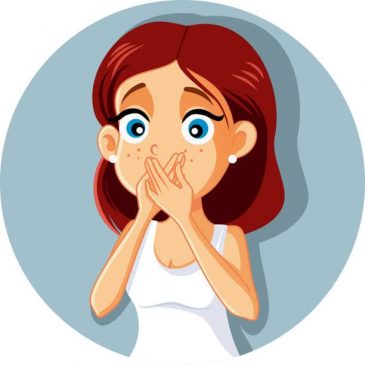A hiccup is an involuntary, repetitive movement of the diaphragm followed by a quick closing of the vocal cords, which produces the distinctive “hic” sound. There are many types of hiccups classified according to the duration by which they last.
A bout of hiccups usually results in a few minutes. However, in rare cases, hiccups could go on for days and weeks (persistent hiccups) or a few months and even go as long as a whole year (chronic, intractable hiccups). There are many theories on what causes hiccups; this article attempts to analyze them from various points of view.
Symptoms of the hiccup other than the characteristic “hic” are:

- A series of diaphragm spasms varying in spacing and duration.
- A brief, unexpected tremor of the throat, shoulder, abdomen or even the whole body.
- A tightening sensation in the chest, abdomen or throat proceeds the sound.
The “hic” sound itself might be present as an audible chirp (squeak) or a quick inhaling gasp or a sniff.
What Causes Hiccups?
The answer to this question depends on the approach we analyze “why do people get hiccups?”
From an evolutionary point of view, scientists believe that hiccups started hundreds of years ago when our ancient ancestors lived in the sea and possessed gills to help them breathe. They would push water through their gills by squeezing their mouths shut while closing the glottis and stopping water from entering their lungs. This process resulted in a hiccup.
Scientists closely studied Tadpoles as examples mimicking our great ancestors due to their abilities as amphibians to live both on land and under the sea. For example, to breathe underwater, a tadpole fills its mouth with water, closes the glottis and forces the water out through the gills.
Amphibians perform their complicated breathing procedure using the exact pathophysiological mechanism by which humans hiccup. When water enters their mouth, stimulation of the nerves occurs. When stimulated, the brain emits signals to start the motion of the gills, similar to the signs that the human brain sends to the diaphragm.
What Causes Hiccups in Folklore?
Hiccups are very significant in many cultures. As a result, hundreds of folk tales, home remedies, and superstitions either try to get rid of hiccups or decipher the reasons behind them.
Slavic and Baltic folk stories claim that hiccups happen to you when someone is gossiping about you. Folklore suggests that the only way to get rid of the hiccup is to guess the name of the person complaining about you.
Russian folklore believes that you hiccup when someone is thinking about you at this moment, sending you secret good wishes or probably missing you.
Indian folklore specifies hiccuping to a member in your family thinking about you right now.
In some European cultures, you hiccup because your body is trying to expel the negative energy that someone has sent you or wished upon you.
Stories from Japanese culture claim that if you hiccup 100 consecutive times, you will die soon.
In some ancient cultures, possession by the devil is what causes hiccups. As a result, some cultures treated people who hiccup with fear and performed cleansing rituals to send the evil spirits away.
What Causes Hiccups in Fetuses?
Many mothers have wondered why they sometimes feel faint rhythmic movements that differ from kicking during pregnancy. Scientists believe that fetal hiccups are a very natural way of regulating fetal breathing in the womb.
Two-month-year-old fetuses hiccup in the womb before any other breathing movements appear. However, the mother won’t feel the fetus’s hiccups before the third trimester when it is more developed and more prominent in size. There are various theories as to what causes a hiccup in a fetus:
- Fetal hiccups are signs of central nervous systems maturity. The CNS is sending signals to the lungs and diaphragm to work. Hiccups result from fetuses drinking the amniotic fluid and breathing it out to prevent it from entering the lungs.
- Fetal hiccups are contractions that occur to prepare the fetus’s respiratory muscles for breathing after birth.
- Sometimes the umbilical cord would wrap around your fetus’s neck, pressing a bit tight and restricting oxygen flow (cord compression). Fetal movements and hiccups would exceed the average rate, and your doctor would order an ultrasound to check on your fetus’s condition.
- The fetus develops a reflex to suckle.
If you are pregnant, you will generally feel your baby hiccuping at least once during the pregnancy. Some fetuses hiccup daily, and others hiccup at frequent time intervals.
What Causes Hiccups in Babies?
Newborns develop the hiccup reflex as soon as they learn to suckle. Infants spend over half an hour a day hiccuping. Babies hiccup as they suckle their mothers’ breasts to prevent milk from entering their lungs.
When the diaphragm contracts, the glottis shuts off the windpipe, and the baby produces the “hic” sound. Scientists argue that most of the nerve cells active during suckling are also fired up during hiccupping.
Hiccups in infants are caused by:
- Overfeeding.
- Immature diaphragm.
- Swallowing air while feeding.
- A sudden drop in temperature.
- Particular food choices in mother’s diet: eggs, peanuts, caffeine, chocolate, citrus fruits and soy products.
If your baby’s hiccups are interrupting feeding or sleep, the hiccuping sessions are taking longer than expected and the baby spits while hiccuping; your baby might be suffering from gastroesophageal reflux disease (GERD). This is a digestive disorder in which the stomach contents leak backwards into the oesophagus, which causes heartburn and other digestive disorders.
You should schedule a meeting with your baby’s doctor immediately if the hiccups get too severe and too frequent. A doctor issues GERD treatment, but there are many measures that you could take to relieve symptoms of GERD-induced hiccups:
- Burping your baby more frequently.
- Feeding your baby quite often, whether by bottle or breastfeeding. Feeding helps relax the diaphragm.
- Sit your baby up and gently pat them on the back till the hiccup is relieved.
- Avoid sudden changes in temperature and keep your baby warm.
- Adjust your baby’s position while feeding.
- Provide your baby with a pacifier to suck on during bouts of hiccup.
- Feed when your baby is calm.
- Feed your baby in smaller portions and at shorter intervals.
What causes Chronic Hiccups?
In most cases of chronic hiccups, the exact cause remains unknown. The mind causes hiccups that go away with sleeping and return shortly after waking up. Chronic hiccup is a severe condition and may eventually lead to fatigue, malnutrition, dehydration, and even death.
Chronic hiccups arise from a variety of factors:
- Fear.
- Hysteria.
- Shock.
- Personality disorders such as paranoia, schizophrenia, obsessive-compulsive disorder (OCD), etc.
- Depression.
Chronic hiccups could be a symptom of an underlying condition such as:
- Pregnancy
- Central nervous system diseases (stroke, ischemia, tumours, bacterial infections, head injury) or disorders (encephalitis, meningitis or multiple sclerosis).
- Decreased kidney or liver functions.
- Hyperventilation.
- Electrolyte imbalance (results from illness, excessive fluid loss, excessive heat or exercise).
- Vagal or phrenic nerve irritation in the head, neck or chest. This could be due to the presence of irregular hair in your ear touching your eardrum, tumour or cyst in your neck, sore throat or laryngitis.
- Respiratory diseases such as asthma, pneumonia and bronchitis.
- Uremia (a metabolic abnormality that causes urea to be present in the blood).
- Irritation of the urinary bladder.
- Alcoholism.
What Causes Hiccups in Adults?
Hiccup bouts in adults last from several seconds to a few days. Precisely what causes hiccups? It is still unknown, but the most common cause is a full stomach which results in bouts of hiccups that last for only a few minutes. A full belly is the main reason behind what causes hiccups after eating.
Reasons behind a full stomach are mainly unhealthy eating habits like
- Eating too fast
- Swallowing air with food or while chewing gum
- Eating or drinking too much
- Eating a fatty meal or a spicy meal
- Drinking carbonated beverages with meals
- Drinking too much alcohol
- Drinking a hot drink followed by a cold one causes a sudden change in stomach temperature.
- Others include smoking and emotional stress.
Other causes for hiccup bouts in adults include:
- Coughing.
- Bloating.
- Abdominal surgery.
- Neuromyelitis Optica (a central nervous system (CNS) disease affecting the optic nerves and spinal cord due to myelin loss).
- Noxious fumes.
- Sudden change in room temperature.
Some medications cause hiccups as side effects. Among these medications are:
- Barbiturates (Phenobarbital, sodium thiopental and pentobarbital).
- Opiates (Codeine).
- Steroids (Androgens, estrogens and corticosteroids).
- Antiparkinsonian agents (Levodopa).
- Acid reflux medications (Omeprazole, dexlansoprazole and metoclopramide).
- Benzodiazepines (Diazepam, alprazolam and lorazepam).
- Antiemetic (Ondansetron).
- Chemotherapeutic agents.
Treatment of Hiccups:
Hiccups are self-limiting disorders meaning that most episodes would subside spontaneously without medical intervention. Treatment focuses on managing underlying medical conditions. There are thousands of home remedies and folk recipes for relieving hiccups, especially short-term episodes in every culture.
Medications are only suggested in case of persistent or intractable hiccups. Hiccup treatment is case-specific. This means that if you know what causes hiccups, you can only then discover the cure.
The only FDA-approved medication for treating hiccups is chlorpromazine, a low-potency antipsychotic known for its powerful anticholinergic, antidopaminergic, antihistaminic, and anti-adrenergic effects. Non-pharmacologic treatment includes invasive surgical procedures such as microvascular decompression of the vagus nerve and phrenic nerve ablation.















